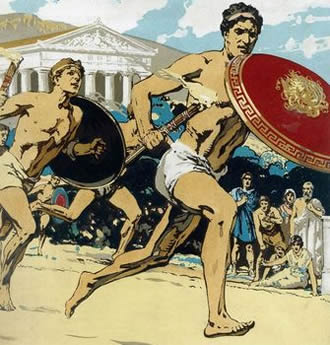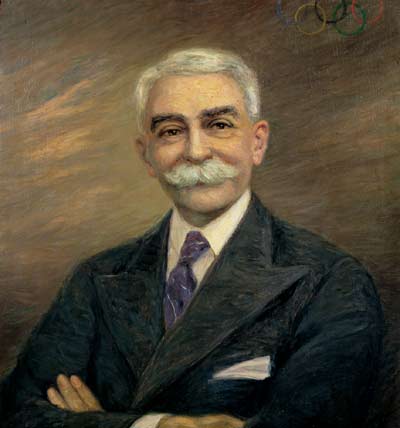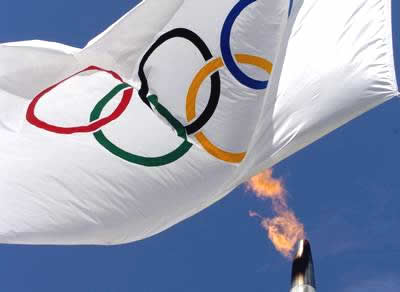Olympic Games, Olympiad games are the largest international comprehensive sports competitions of our time, which have been held every four years. The tradition that existed in ancient Greece was revived by the French public figure Pierre de Cuberten at the end of the 19th century. The Olympic Games, also known as the Summer Olympic Games, were held every four years, starting from 1896, with the exception of the years that came to world wars. In 1924, the Winter Olympic Games were established, which were originally held in the same year as the summer. However, since 1994, the time of the Winter Olympic Games has been shifted by two years relative to the time of the summer games.

Antique Olympic Games
The Olympic Games of Ancient Greece represented a religious and sports festival held in Olympia. Information about the origin of the games has been lost, but several legends describing this event have been preserved. The first documented celebration dates back to 776 BC. e., although it is known that games were held earlier. At the time of the games, a holy truce was declared, at this time it was impossible to wage war, although this was repeatedly violated.
The Olympic Games have significantly lost their significance with the advent of the Romans. After Christianity became an official religion, the games began to be considered as a manifestation of paganism and in 394 not. e. They were prohibited by Emperor Theodosius I.
The revival of the Olympic idea
The Olympic idea and after the ban on ancient competitions did not disappear. For example, in England, during the XVII century, “Olympic” competitions and competitions were repeatedly held. Later, similar competitions were organized in France and Greece. Nevertheless, these were small events, which, at best, were regional in nature. The first real predecessors of the modern Olympic Games are Olympias, which were held regularly in the period 1859-1888. The idea of the revival of the Olympic Games in Greece belonged to the poet Panayotis Suzos, and the public figure Evangelis Zapspas brought it into life.
In 1766, as a result of archaeological excavations in the Olympia, sports and temple structures were discovered. In 1875, archaeological studies and excavations continued under the German leadership. At that time in Europe, romantic-idealistic ideas about antiquity were in fashion. The desire to revive Olympic thinking and culture spread quite quickly throughout Europe. The French Baron Pierre de Cubertin (French Pierre de Cuubertin) said then: “Germany excavated what was left of ancient Olympia. Why can’t France restore old greatness? ”
According to Kuberten, it was the weak physical condition of the French soldiers that became one of the causes of the Frenchmen in the Franco-Prussian war 1870-1871. He seeks to change the situation by improving the physical culture of the French. At the same time, he wanted to overcome national egoism and make a contribution to the struggle for peace and international understanding. The “youth of the world” was supposed to measure forces in sports, and not on the battlefields. The revival of the Olympic Games seemed in his eyes the best solution to achieve both goals.
At the Congress held on June 16-23, 1894 in the Sorbonne (University of Paris), he presented his thoughts and ideas to the international public. On the last day of Congress (June 23), it was decided that the first Olympic Games of modernity should be held in 1896 in Athens, in the country of the Rodant of Games-Greece. To organize games, the International Olympic Committee (IOC) was founded. The first president of the committee was Greek Demetrius Vikelas, who was president before the end of the I Olympic Games of 1896. Baron Pierre de Cuberten became the Secretary General.

The first games of our time were really very successful. Despite the fact that only 241 athletes (14 countries) took part in the games, the games have become the largest sporting event that has ever passed since ancient Greece. Greek officials were so satisfied that they put forward a proposal for the “eternal” holding of the Games of the Olympics in their homeland, in Greece. But the IOC introduced a rotation between different states, so that every 4 years the games were changed.
After the first success, the Olympic movement experienced the first crisis in its history. Games 1900 in Paris (France) and Games 1904 in St. Louis (Missouri, USA) were combined with world exhibitions. Sports competitions stretched for months and almost did not enjoy the audience. Almost only American athletes participated in the games in St. Louis, since it was very difficult to get through the ocean from Europe for technical reasons.
At the 1906 Olympic Games in Athens (Greece), sports competitions and results reached the first place. Although the IOC initially recognized and supported the holding of these “intermediate games” (just two years after the previous ones), now these games are not recognized as Olympic. Some sports historians consider the 1906 games to be salvation of the Olympic idea, since they did not give the games to become “meaningless and unnecessary.”
Modern Olympic Games
The principles, rules and provisions of the Olympic Games are defined by the Olympic Charter, the foundations of which are approved by the International Sports Congress in Paris in 1894, who, at the suggestion of the French teacher and public figure Pierre de Cubertin, the decision to organize the games on the model of ancient and the creation of the International Olympic Committee (IOC).

According to the Charter of the Games of the Olympiad “… they unite amateur athletes of all countries in honest and equal competitions. In relation to countries and individuals, no discrimination for racial, religious or political motives is allowed … ” Games are held in the first year of the Olympiad (4-year period between games). The account of the Olympiads has been kept since 1896, when the first Olympic Games were held (I Olympics-1896-99). The Olympics receives its number in cases where the games are not held (for example, VI-in 1916-19, XII-1940-43, XIII-1944-47). A symbol of the Olympic Games – five fastened rings symbolizing the unification of five parts of the world in the Olympic movement, the so -called. Olympic rings. The color of rings in the upper row is blue for Europe, black for Africa, red for America, in the lower row – yellow for Asia, green for Australia. In addition to the Olympic sports, the Organizational Committee has the right to include indicative competitions in 1-2 sports in its choice, not recognized by the IOC. In the same year as the Olympics, from 1924, the Winter Olympic Games are held, which have their own numbering. Since 1994, the terms of the Winter Olympic Games were shifted by 2 years relative. The venue for the Olympics chooses the IOC, the right to organize them is granted to the city, not the country. Duration no more than 15 days (winter games – no more than 10).
The Olympic movement has its own emblem and flag approved by the IOC at the suggestion of Cuberten in 1913. The emblem is Olympic rings. The motto is Citius, Altius, Fortius (faster, higher, stronger). The flag is a white panel with Olympic rings, since 1920 it rises at all games.
